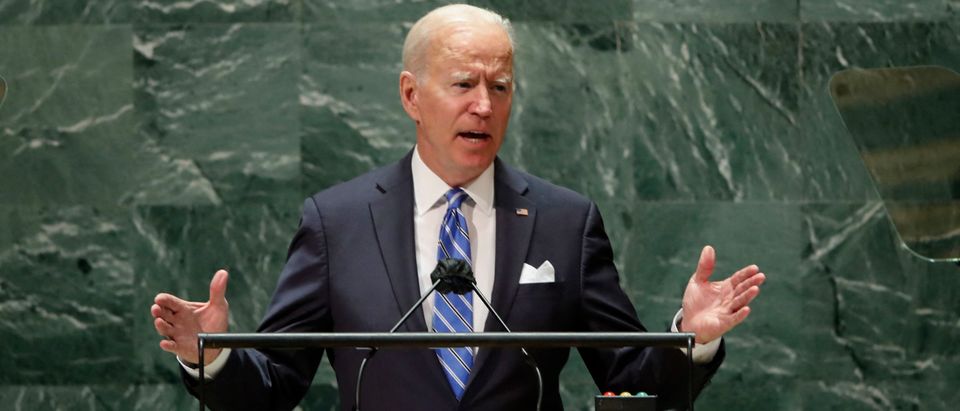President Joe Biden, who ran in 2020 on his foreign policy chops, displayed an astounding lack of courage and knowledge of diplomacy during his Tuesday address at the United Nations General Assembly.
Biden echoed past presidents like Ronald Reagan and John F. Kennedy in his call for international cooperation, even with geopolitical rivals, to solve global issues, but unlike those presidents he failed to identify America’s enemies and hold them responsible for their transgressions.
During his speech, Biden emphasized that “We are not seeking the new Cold War or the world divided into rigid blocks.” That appeared to be a reference to China, which has been steadily expanding its influence around the world as well as increasing its military presence in the South China Sea and around Taiwan.
While he did mention human rights abuses in Xinjiang, Biden did not name China once, let alone take it to task for its blatant attempt to cover up responsibility for a global pandemic that has caused havoc on a global scale.
Biden may not be seeking a new Cold War, but it’s happening. Pretending like it isn’t only gives China a further advantage. They steal our technology and flaunt copyright laws with impunity, manipulate international trade standards to gain egregiously lopsided trade deals and even indoctrinate our students on college campuses through Confucius Institutes. Our politicians are too afraid to even call China an enemy, much less treat it like one. It is vital to the survival of a nation that it be able to identify and act against foreign enemies, and we are currently unable to do just that.
One of the basics of foreign policy is clearly defining which countries are friends and which ones are enemies and taking appropriate action thereafter. Treating our enemies on an equal footing as our friends not only gives our rivals leeway to get away with much more and provide them undue legitimacy, but it also discourages our allies.
When we kowtow to Xi Jinping and treat him as a longtime friend even as he’s robbing us blind, how does that make our actual allies feel? What respect or comradeship do leaders like Boris Johnson, Emmanuel Macron, Narendra Modi or Yoshihide Suga owe us when they see how foolish we’ve become?
Bringing attention to the abuses against the Uyghurs in Xinjiang but not calling out the country carrying out those atrocities by name is the height of cowardice, and the rest of the world takes note — especially at a place like the U.N. General Assembly.
Biden chose to adopt a very cooperative tone for his address, saying, “The United States is ready to work with any nation that steps up, that pursues peaceful resolution to shared challenges, even if we have intense disagreement to shared challenges, because we will all suffer the consequences of our failures if we don’t come together to tackle COVID-19, climate change or threats like nuclear proliferation.”
And yes, presidents generally try to foster a sense of international community during speeches at an inherently cooperative organization like the U.N., but unlike Biden, past occupants of the Oval Office have not been afraid to call out bad actors by name.
Biden’s fellow Democrats Harry Truman and John F. Kennedy certainly did. Truman denounced North Korea’s invasion of its southern counterpart in his October 1950 address, decrying the invasion as “a direct challenge to the principles of the United Nations.”
Just two months before his assassination in 1963, Kennedy spoke before the U.N. General Assembly and proclaimed that the U.S. was willing to work with the Soviet Union to resolve global problems, saying that “Responsibilities require our two nations to concentrate less on our differences and more on the means of resolving them peacefully.”
But he did not shy away from acknowledging that the two nations were rivals and that cooperation would not compromise America’s resolve to defend its interests.
“These are the basic differences between the Soviet Union and the United States, and they cannot be concealed. So long as they exist, they set limits to agreement, and they forbid the relaxation of our vigilance. Our defense around the world will be maintained for the protection of freedom — and our determination to safeguard that freedom will measure up to any threat or challenge.”
Even Ronald Reagan, who made his contempt for Soviet tyranny extremely clear in his first address to the Assembly in 1982, left the door open to cooperation, saying, “I have, therefore, directed the exploration of ways to increase understanding and communication between the United States and the Soviet Union in times of peace and of crisis.”
But he also warned that “Since World War II, the record of tyranny has included Soviet violation of the Yalta agreements leading to domination of Eastern Europe, symbolized by the Berlin Wall—a grim, gray monument to repression that I visited just a week ago. It includes the takeovers of Czechoslovakia, Hungary, and Afghanistan; and the ruthless repression of the proud people of Poland.”
These past presidents had the wisdom to articulate what Biden cannot — that the U.S. can simultaneously work with our rivals to resolve common issues and also have the courage to call out their transgressions. China has flaunted the “rules-based order” the U.S. has tried to impose on the world since the end of the Cold War, and, if left unchecked, they may succeed in toppling America’s hegemony on the world stage.
Hayden Daniel is the opinion editor at the Daily Caller.


